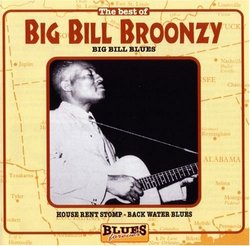| All Artists: Big Bill Broonzy Title: Best of Members Wishing: 0 Total Copies: 0 Label: Blues Forever Release Date: 8/10/2004 Genres: Country, Blues, Pop Styles: Classic Country, Chicago Blues, Traditional Blues, Acoustic Blues Number of Discs: 1 SwapaCD Credits: 1 UPCs: 828317681022, 8004883680108 |
Search - Big Bill Broonzy :: Best of
 | Big Bill Broonzy Best of Genres: Country, Blues, Pop
|
Larger Image |
CD DetailsSimilar CDs |
CD ReviewsA Big Bill Encore Alfred Johnson | boston, ma | 11/21/2008 (4 out of 5 stars) "I am in the process of reading and re-reading many of the books of oral history interviews collected by the recently departed Studs Terkel. As part of that process I have read his last work (published in 2007), a memoir of sorts but really a series of connected vignettes, that goes a long way to putting the pieces of Studs' eclectic life together. A fact that I did not know is that Studs' had radio and television music shows in the Chicago of the 1950's. On one of those shows he performed with the blues/jazz folk artist under review here, Big Bill Broonzy. That long ago reference was enough for this reviewer to scamper back to give a listen to the melodious voice of one of the best in these traditions. But that begs the question of where to start? That is not merely a rhetorical question here. My first exposure to Big Bill, back in the mists of times, was as a performer on a Sunday night folk program here in Boston. In that format he was presented as a folk singer in the style of a black Pete Seeger. Including in that case many leftist political songs dealing with the pressing questions of race and class. Later I found some more jazzy works by him and some more raucous material in the old country blues tradition. So I hope you can see my dilemma. The hard fact is that certain musicians, certain very talented musicians, can work more than one milieu or can transform themselves (for commercial or other reasons) into more than one genre. Moreover, in Big Bill's case, the confluence of folk, blues and jazz at some points is fairly close. That versatility issurely displayed by him on this CD compilation. So give a listen to that voice, that guitar and those wonderful songs. I might add that, although it seemed to be a given at the time, some of Big Bill lyrics are on point on the questions of racial segregation and other social issues. Think of the songs like "Brown, Black and White" or his version of "This Train" (that whipsaws Jim Crow very nicely). Needless to say " In The Evening" evokes the old rural days and the struggle against segregation . That, my friends, is the real connection with old Studs, that is for sure. " Great blues singer in good voice Steven A. Peterson | Hershey, PA (Born in Kewanee, IL) | 08/04/2007 (5 out of 5 stars) "Big Bill Broonzy was another of the great blues singers. This album well illustrates his talent and his art. Cuts were recorded between 1936 and 1951. A few songs to exemplify his work: "House Rent Stomp" is an instrumental. He flashes nice guitar work (acoustic). The work moves along smoothly. "John Henry": Yes, he is covering the old traditional song that we all know so well. It's just Big Bill, his guitar, and the music. And a great blues voice. He provides the listener with a wonderful blues sensibility in his rendering of this song. "Big Bill Blues": A standard blues song about "losin' [his] baby." This was recorded in 1936 and features some nicely done piano work to support his vocals and guitar work. He is in good voice indeed. Some basic lines: "I got up this mornin' Feelin' so blue. I lost my baby Now tell me what I'm going to do. I'm so lonesome. These blues keep doggin' me." This CD is a prime indicator of why Broonzy is held in such high esteem by fans of the blues." Great original blues Mr. Michael J. Lupo | 03/17/2007 (5 out of 5 stars) "Being a big Elvis fan and knowing that Bill Broonzy & Arthur Crudup were the King's 2 favorites when he was young, I was curious what his influences sounded like. I had already heard Crudup. Well Big Bill did not disappoint. Fantastic stuff."
|

 Track Listings (18) - Disc #1
Track Listings (18) - Disc #1